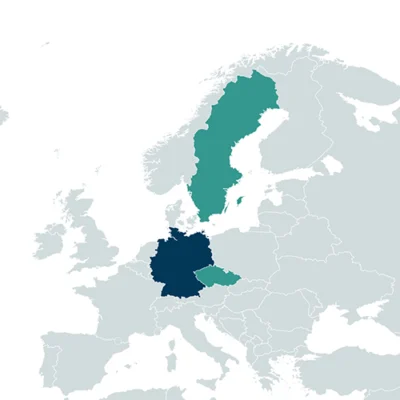Enabling use of biodiversity monitoring data in local conservation management
Call
Duration
01/01/2024 – 31/12/2026
Total grant
Approx. 800 thsd. €
More information
Florian D. SCHNEIDER
florian.schneider@isoe.de
Partners of the project
- ISOE – Institute for Social-Ecological Research, Frankfurt am Main, Germany
- CzechGlobe – Global Change Research Institute of the Czech Academy of Sciences (UVGZ), Brno, Czech Republic
- Department of Biology & Centre for Environmental and Climate Science, Lund University, Lund, Sweden

Context
Local land-use and conservation management practices are key drivers of biodiversity change. However, the integration of biodiversity monitoring data into local-scale conservation management is hampered by the limited taxonomic and ecological scope of existing data, insufficient spatio-temporal coverage for the local context, or restrictions on the availability and accessibility of data products, despite their relevance for local decision-making. At the same time, biodiversity knowledge and data held at the local level by conservation practitioners and authorities are rarely fed into biodiversity data infrastructures to inform broader research on management practices and policy. Therefore, bridging these gaps between biodiversity monitoring efforts and data infrastructures for policy recommendations at the national or transnational levels, and practical decision- making on land-use and conservation management at local scales is of utmost importance.
Main objectives
ENABLElocal follows three research objectives:
- to identify local land-use and conservation management needs and issues that can be informed by biodiversity monitoring data, and describe the social challenges of a data integration;
- to match data demands with existing species and habitat data across spatio- temporal scales, to identify gaps, and to assess the capacity to fill the gaps via remote sensing-based biodiversity monitoring;
- to enable data integration across scales by leveraging instruments and capacities in local decision-making for land-use and conservation management.
Main activities
To achieve these objectives, we employ a transdisciplinary research approach with stakeholder participation in all phases of the research process. A series of workshops and interviews with local practitioners in land-use and conservation management, as well as researchers and decision-makers, will identify practice- relevant research questions, develop a mutual exchange of knowledge, and generate policy recommendations, products, and tools for application and outreach. These “living labs” will be conducted in three case studies located in the partner countries, focusing on conservation and land-use practices in a) a biosphere reserve (CZ), b) biodiversity hotspot areas on sandy soils (SE) and c) extensive apple orchard meadows (DE).
The participatory research aims at immediate transformative effects in the local case study settings and to develop generalised recommendations for policy and research at national and international level. Overall, the project aims to enable data flows among conservation management actors, biodiversity monitoring schemes, and national, European, and global data infrastructures, and to evaluate data usefulness for supporting decision-making in local land-use and conservation management. Outcomes from local case studies will be synthesised into openly accessible knowledge products (a practitioners’ handbook, a report on the outcomes of the local workshops in local languages) and presented at an international practitioners’ workshop (free online event) to support capacity building beyond the participating case study practitioners.


